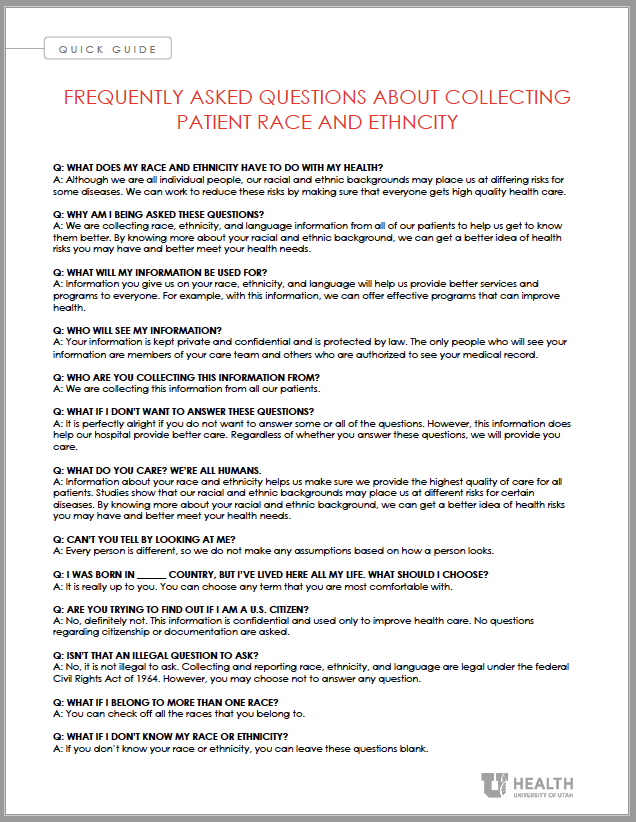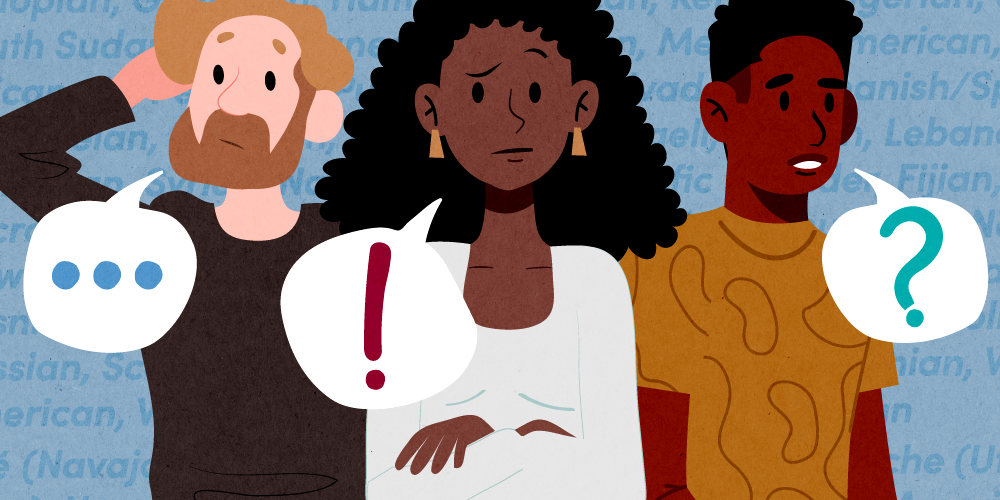a patient relations specialist, I check people in for appointments. But it's not only making sure they’re ready for their appointment–it's about having conversations with patients and making them feel comfortable in our medical setting.
Part of comfort means respecting different cultural beliefs and backgrounds. Collecting more options for our patients’ race and ethnicity means that we can have accurate information that helps improve care for both the individual and for the population. For example, sickle cell anemia is an inherited disease that disproportionally affects Black and African American people. When we understand a patient’s background, we can better understand how to care for them.
When to ask
It’s the right time to ask when you are verifying information, such as address and phone number.
How to ask
I hand the patient the provided list, and say "I just want to verify that we have the correct information. Can you to tell me what race and ethnicity you identify with? You get to choose more than one.”
If a patient says “I’m African American,” I point to the list, and say “Can you tell me your background?”
I am deliberately not asking “What race are you?” Asking an open-ended question that includes how someone identifies with race and ethnicity provides freedom to choose.
Most people liked hearing that they could choose more than one race and ethnicity. People remarked to me that it was always frustrating to choose a particular side of their background. Some would even say “Wow, I get to choose, and it matters to you where I’m from?” It was great to see patients light up in that way.
When patients ask why
A few patients ask why we collect this information. I tell them that the more we know about an individual, the more we can help them. I also tell them they are free not to disclose their identity with us. I tell them “You can share if you want to.” There is no need to start an argument.
Its important to be comfortable and practice asking the question. When my colleagues ask why I’m comfortable asking patients about sensitive information, I remind them that we're in a medical setting. If we were selling cars, it would be totally inappropriate to ask about a patients’ race and ethnicity. But in the medical setting, patients expect to be asked sensitive questions. If we display hesitation and discomfort, the patient picks up on that discomfort and they may not trust you with the information.
FAQ Quick Guide to Collecting Patient Race And Ethnicity

Click here for a quick quide to frequently asked questions.
FREQUENTLY ASKED QUESTIONS ABOUT COLLECTING PATIENT RACE AND ETHNCITY
(adapted from Agency for Healthcare Research and Quality Healthcare Cost and Utilization Project)
A: Although we are all individual people, our racial and ethnic backgrounds may place us at differing risks for some diseases. We can work to reduce these risks by making sure that everyone gets high quality health care.
A: We are collecting race, ethnicity, and language information from all of our patients to help us get to know them better. By knowing more about your racial and ethnic background, we can get a better idea of health risks you may have and better meet your health needs.
A: Information you give us on your race, ethnicity, and language will help us provide better services and programs to everyone. For example, with this information, we can offer effective programs that can improve health.
A: Your information is kept private and confidential and is protected by law. The only people who will see your information are members of your care team and others who are authorized to see your medical record.
A: We are collecting this information from all our patients.
A: It is perfectly alright if you do not want to answer some or all of the questions. However, this information does help our hospital provide better care. Regardless of whether you answer these questions, we will provide you care.
A: Information about your race and ethnicity helps us make sure we provide the highest quality of care for all patients. Studies show that our racial and ethnic backgrounds may place us at different risks for certain diseases. By knowing more about your racial and ethnic background, we can get a better idea of health risks you may have and better meet your health needs.
A: Every person is different, so we do not make any assumptions based on how a person looks.
A: It is really up to you. You can choose any term that you are most comfortable with.
A: No, definitely not. This information is confidential and used only to improve health care. No questions regarding citizenship or documentation are asked.
A: No, it is not illegal to ask. Collecting and reporting race, ethnicity, and language are legal under the federal Civil Rights Act of 1964. However, you may choose not to answer any question.
A: You can check off all the races that you belong to.
A: If you don’t know your race or ethnicity, you can leave these questions blank.
Nichole Misner
Rising racist aggressions against the backdrop of an anxious and unnerving year can exacerbate the trauma racial groups and minorities experience. Megan Call of the Resiliency Center, social worker Jean Whitlock and EDI expert Mauricio Laguan explain racial trauma and how kindness, to ourselves and each other, is what this moment demands.
Accurate, self-reported race and ethnicity data is necessary to create visibility of health disparities, provide inclusive care, and improve equity of health outcomes. Patient access manager Kim Birrell, Revenue Cycle Coordinator Theresa Johnson, and Care Navigation Program Coordinator Erica Ulibarri share tools for leaders to support employees.
University of Utah Health Transgender Health Program’s Ariel Malan and family physician Erika Sullivan discuss the Mountain West Transforming Care Conference, an annual conference held to promote LGBTQIA+ health and provider competency of caring for these communities.
